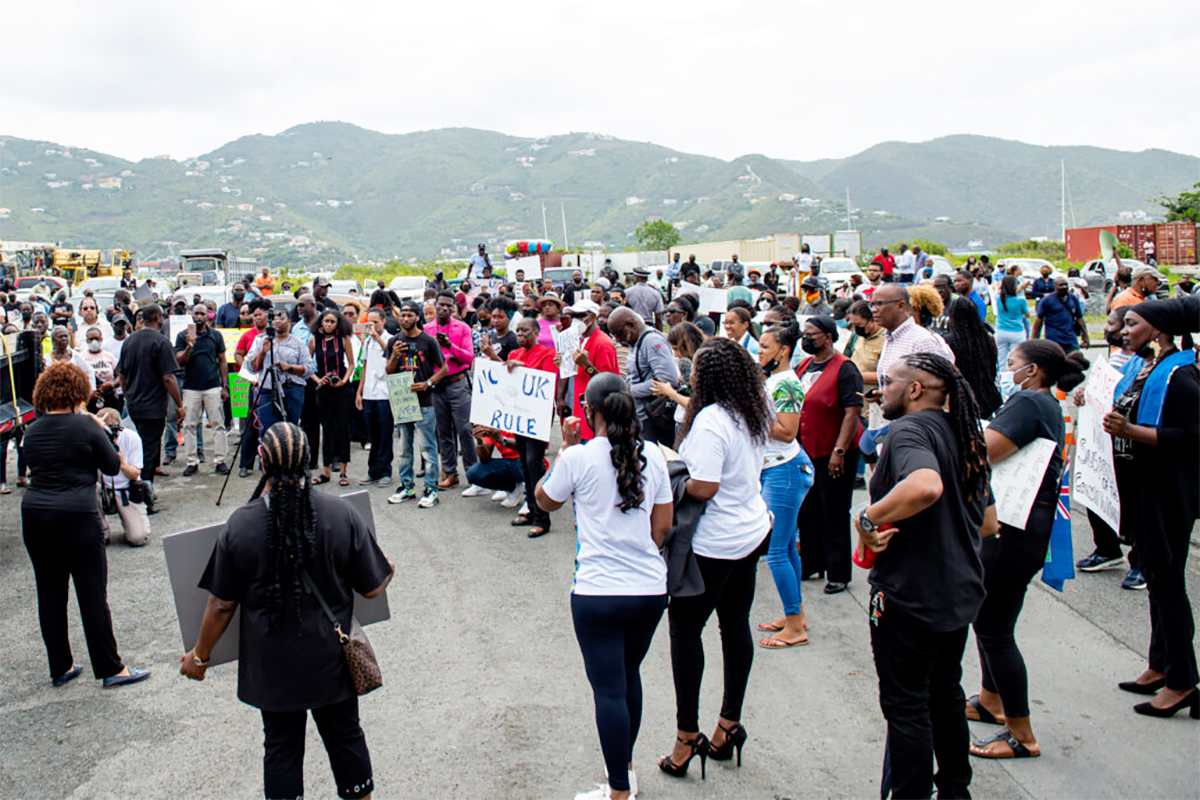British Virgin Islanders Draw For Bob Marley, Tony Rebel Songs In Protest Over Direct UK Rule

Protesters in the British Virgin Islands have drawn for Redemption Song, one of Bob Marley’s biggest political songs and Tony Rebel’s If Jah, to solidify their opposition to plans by the UK to impose direct rule on the territory, following the arrest of their elected leader Premier Andrew Alturo Fahie, on cocaine smuggling charges.
According to award-winning British-Jamaican journalist of The Independent newspaper, Nadine White, the demonstrators have likened to “colonialism”, the plans to rule the islands from London. The protests come in the aftermath of Fahie’s arrest in Miami on Thursday on drug conspiracy and money laundering charges in an operation led by the Drug Enforcement Agency (DEA), in which the BVI’s director of ports, Oleanvine Maynard, was also nabbed.
“They’re currently playing ‘If Jah Is Standing by My Side’ by Tony Rebel. Before that, it was ‘Redemption Song’ by Bob Marley. Burning a big fire – metaphorically speaking – and literally saying ‘no to UK rule’,” Race Correspondent Nadine White, wrote shortly after 6:00 on Monday morning on Twitter.
They're currently playing 'If Jah Is Standing by My Side' by Tony Rebel. Before that, it was 'Redemption Song' by Bob Marley. Burning a big fire – metaphorically speaking – and literally saying 'no to UK rule'.
— Nadine White. (@Nadine_Writes) May 2, 2022
Redemption Song was the final track on Uprising, Bob Marley’s final studio album, which was released in 1980. It was also his last record before he died of cancer in May 1981. Marley, who was born in Nine Miles, St. Ann, had written the song in 1979, after he became afflicted with cancer.
In 2014 Redemption Song was ranked 66th amongst Rolling Stone Magazine’s 500 Greatest Songs of All Time. Four years earlier, in 2010, the New Statesman also listed it as one of the Top 20 Political Songs.
The song’s title was also used as the headline for an article about Jamaica’s economic recovery which published in The Economist magazine in November 2019. The song was also in 2020 used at the forefront of a demonstration in India by musicians who sought to raise their voices against a citizenship law.
In January 2020, Popdust music magazine also listed Redemption Song at number three of the Seven Best anti-war songs, describing it as “timeless and of its time”, and Bob Marley as “one of few voices to capture the fear of war and spin it into something like hope”.
Redemption Song’s lyrics were partially inspired by Jamaica’s first National Hero, Marcus Mosiah Garvey, who uttered the lines: “We are going to emancipate ourselves from mental slavery because whilst others might free the body, none but ourselves can free the mind” in his 1938 speech titled The Work That Has Been Done, which were later adapted and used in the song as: “Emancipate yourself from mental slavery, none but ourselves can free our minds”.
Tony Rebel’s 1997 song If Jah, was written by himself and released on his Lalabella riddim for his label Flames Records and consisted of arguably Reggae/Dancehall’s biggest conscious beat of all time, with songs such as Aaron Silk’s The Right Path, Everton Blender’s Ghetto People Song, Honey Comb’s Hurt No More, Ras Shiloh’s Are You Satisfied and Uton Green’s No Looking Back. A video medley of the songs on the riddim was also released that year.
The most popular song on that beat, If Jah incorporates several bible verses including lines from Psalm 118, 91 and 27 and Matthew 16.
The song was also the lead track on the Manchester native’s 16-track if Jah album, which consisted of other hit tracks such as Know Jah, Celebrate Life Human Blood, Revolution, Bible Chant, and Think on These Things.
If Jah is standing by My Side was such a big international hit that Rebel released a Spanish version titled Si JAh a Lado de Mi.
Hours after her tweet, White wrote that hundreds of demonstrators had gathered outside of Government House in Tortola, the residence of the Governor General John Rankin, following an inquiry led by British judge Sir Gary Hickinbottom into corruption which recommended the islands be “governed from London for two years”.
“It is being proposed that Mr Rankin, who represents the Queen, should assume the position of premier in place of an elected government official,” she noted.
According to White’s report, many BVI residents are resisting the suggestion, describing it as “colonial”, especially in the context of the region’s history as a slave colony of Great Britain’s, as well as undemocratic as the input of the citizens will not be sought.
She noted that the demonstrators had blocked traffic outside the governor’s house and chanted slogans such as “no to British rule” and “no going back to chains”.
With a population of 35,000, the British Virgin Islands is currently governed under a 2007 constitution, which gives it limited self-rule under the Governor, “who is the ultimate executive authority as the representative of the Queen”.
White quoted the acting premier Natalio Wheatley, who in a recent statement, said he was “very concerned” about the recommendation, as “there would be no more elected representatives who represent the people of the districts and the territory in the House of Assembly where laws are made for our society”.
He had also expressed trepidation that there would be no government ministers to advance the public’s priorities or a cabinet to approve policy, as all of that authority “would be vested in the Governor”.
